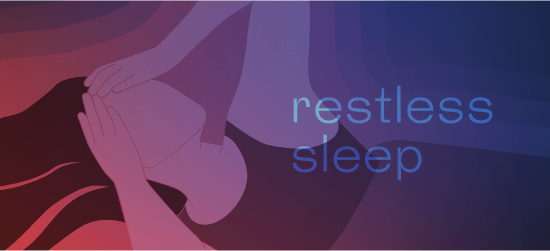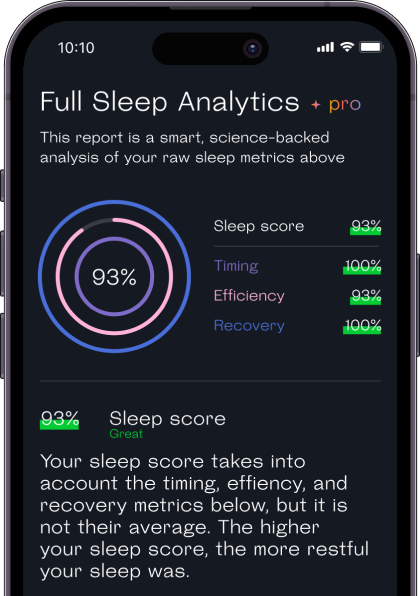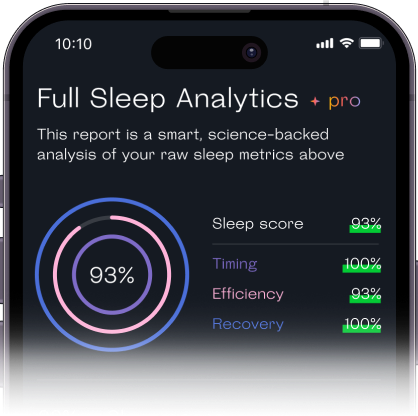


Welltory — All-in-One Wellness App.





Restless sleep, a common issue affecting millions of people worldwide, can significantly impact daily life and productivity. In this article, we’ll discuss the common causes of restless sleep, strategies to improve sleep quality, and how Welltory can be your go-to companion in achieving better sleep.
Apart from sleep apnea, other sleep disorders like restless leg syndrome (RLS) and periodic limb movement disorder (PLMD) can lead to restless sleep. These conditions often cause involuntary limb movements, disrupting sleep continuity.
Alcohol, nicotine, or caffeine close to bedtime can negatively impact sleep quality by increasing arousal and interrupting the sleep cycle.
Chronic pain, gastroesophageal reflux disease (GERD), and hormonal imbalances, such as menopause, can all contribute to restless sleep
As we age, changes in our sleep architecture, such as reduced slow-wave sleep and increased nighttime awakenings, can lead to more restless sleep
CBT for insomnia is an effective, evidence-based treatment for sleep disturbances. CBT techniques include stimulus control, sleep restriction, and relaxation training, which help in breaking negative sleep patterns and creating healthier habits.
Incorporating mindfulness practices and meditation into your daily routine can help reduce stress and anxiety, which in turn can lead to improved sleep quality.
Adopting proper sleep hygiene practices can significantly impact sleep quality. Some key aspects of sleep hygiene include:
a. Establishing a consistent sleep schedule: Going to bed and waking up at the same time every day helps regulate your internal clock.
b. Creating a bedtime routine: Engaging in calming activities before bed, such as reading or taking a warm bath, can signal your body that it’s time to sleep.
c. Limiting exposure to screens: Reducing screen time, especially in the evening, can minimize the impact of blue light on your sleep-wake cycle.
Eating a balanced diet and being mindful of your food choices, particularly in the evening, can influence sleep quality. Avoiding heavy meals and stimulants, such as caffeine and nicotine, close to bedtime is recommended.
Regular physical activity, preferably in the morning or afternoon, can help improve sleep quality by reducing stress, anxiety, and depressive symptoms. However, avoid vigorous exercise close to bedtime as it can stimulate the body and make falling asleep more difficult, aggravating the restless sleep phase even further.
Get Welltory
for better sleep
Get Welltory
for better sleep



Optimizing your sleep environment is crucial for restful sleep. Consider the following factors:
a. Room temperature: Maintaining a cool room temperature (around 65°F or 18°C) can facilitate better sleep.
b. Noise reduction: Minimizing noise through the use of earplugs, white noise machines, or soundproofing can help create a more peaceful sleep environment.
c. Light control: Using blackout curtains or a sleep mask can block external light sources that might disrupt your sleep.
d. Comfortable bedding: Investing in a comfortable mattress and pillow can significantly enhance sleep quality.
While napping can provide a short-term energy boost, excessive or poorly timed naps can disrupt your nighttime sleep. Limit naps to 20-30 minutes and avoid napping too close to bedtime
Certain essential oils, such as lavender and chamomile, have been shown to promote relaxation and improve sleep quality when used as part of a bedtime routine. A 2014 study concluded that the combination of inhaled lavender and sleep hygiene practices led to significant improvements in sleep quality
This technique involves tensing and relaxing various muscle groups to help reduce physical tension and promote relaxation. Regular practice of progressive muscle relaxation can improve sleep quality.
By temporarily limiting the time spent in bed, sleep restriction therapy can help consolidate sleep and reduce periods of wakefulness during the night. This technique should be used under the guidance of a healthcare professional or sleep specialist. We do not recommend all-nighters either.
By implementing evidence-based strategies such as cognitive behavioral therapy, mindfulness, proper sleep hygiene, dietary considerations, regular exercise, and optimizing your sleep environment, you can work towards enhancing your sleep quality. With the right combination of techniques tailored to your individual needs and preferences, you can experience more rejuvenating nights and reap the benefits of improved sleep on your health.
Remember that Welltory can be a valuable resource in monitoring your progress and providing personalized recommendations to help you achieve better sleep and a healthier lifestyle.
Welltory Team, 20 April, 2023
 App Store
App Store
 Google Play
Google Play
 Huawei AppGallery
Huawei AppGallery
 Galaxy Store
Galaxy Store

